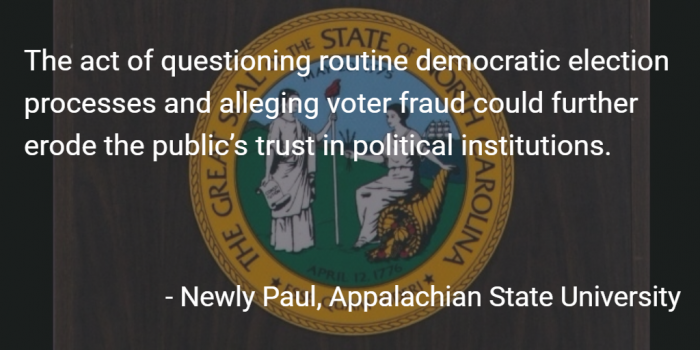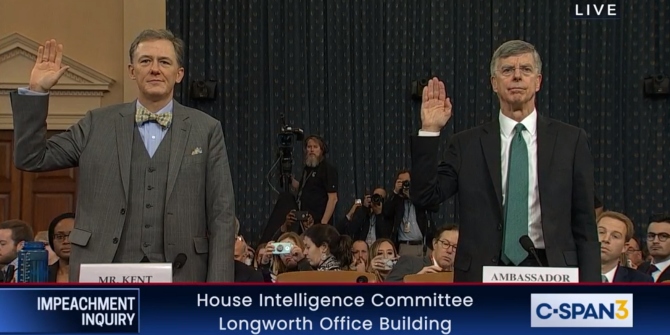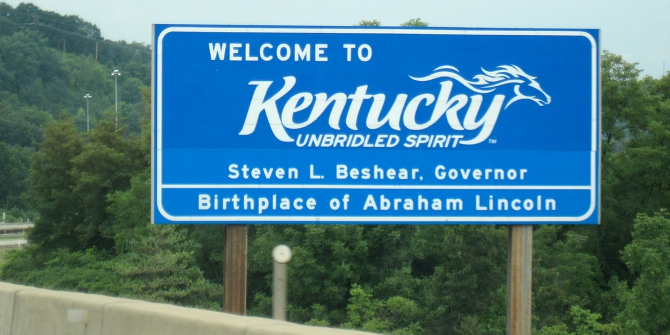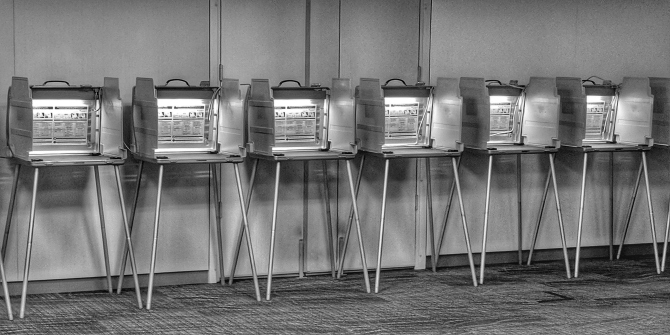 Three weeks on, the results of North Carolina’s gubernatorial election have not yet been declared. Despite losing by nearly 10,000 votes, Governor Pat McCrory initially demanded a statewide recount, but is now pursuing a recount in one county where he alleges voter irregularities have occurred. Newly Paul writes that McCrory’s allegations of voter fraud echo those of Donald Trump, claims which can also lead to greater scrutiny towards groups which assist voters in areas with greater minority populations.
Three weeks on, the results of North Carolina’s gubernatorial election have not yet been declared. Despite losing by nearly 10,000 votes, Governor Pat McCrory initially demanded a statewide recount, but is now pursuing a recount in one county where he alleges voter irregularities have occurred. Newly Paul writes that McCrory’s allegations of voter fraud echo those of Donald Trump, claims which can also lead to greater scrutiny towards groups which assist voters in areas with greater minority populations.
North Carolina may have turned red for the presidential and senate races, but the state’s gubernatorial race still remains too close to call. While Donald Trump won North Carolina by nearly 3 percentage points (about 178,000 votes), incumbent Senator Richard Burr defeated his rival Deborah Ross by nearly 6 percentage points, the state house and senate remained solidly under Republican control, but the governor’s chair remains empty nearly three weeks after the election.
According to latest media reports, Democratic challenger Attorney General Roy Cooper is leading incumbent Republican governor Pat McCrory by about 9,558 votes. Though Cooper declared early victory over his rival on November 10, McCrory’s campaign refused to concede, citing massive voter fraud, and is pushing for a recount. His campaign alleges that vote tampering by election officials, and fraudulent votes cast by felons have swung the election, despite the lack of evidence to support these claims. Initially, McCrory had demanded a statewide recount of all the 4.8 million votes cast for the governor’s office, but later withdrew that request in lieu of a hand count of votes only in Durham County. If the vote margin crosses 10,000 votes, McCrory can no longer ask for a recount.
The governor alleged that poll workers and malfunctioning machines had caused irregularities in about 94,000 votes cast in Durham County, causing Cooper’s vote margins to go up. The Republican Party has alleged voter fraud in 50 of the Tar Heel State’s 100 counties and is currently contesting individual votes in front of several local election boards. Incidentally, several county election boards with Republican-appointed majorities have rejected several of McCrory’s challenges so far, though more challenges remain to be addressed.
McCrory’s allegations of voter fraud echo the larger Republican concern on this issue including Donald Trump, who hinted several times during his campaign that the election was “rigged.” Trump recently responded to the Green Party candidate Jill Stein’s efforts to initiate a recount in Wisconsin with a series of tweets reiterating his concerns about voter fraud. One among these said that he would have won the popular vote if millions of people had not voted illegally. As several news outlets pointed out, he had no evidence to back up this false claim.

These claims of fraudulence in elections can have far-reaching effects, especially among minority communities. In North Carolina for example, McCrory has particularly singled out Democratic get-out-the-vote groups that work to assist voters in areas with high minority populations (such as the Bladen County Improvement Association) and accused them of fraudulent election practices. As a result, these groups are subject to increasing scrutiny and investigation, an experience that may deter members of minority communities from participating in future elections. Overall, the act of questioning routine democratic election processes and alleging voter fraud could further erode the public’s trust in political institutions.
Political analysts say McCrory’s unpopular policies, not voter fraud, are to blame for the unusually close and contentious gubernatorial race. During his time as governor, McCrory passed the HB2 bill, also known as the “bathroom bill,” which required people in public buildings to use bathrooms that correspond to their biological gender. The bill had other provisions including restricting local governments from ensuring that contractors pay fair wages and benefits to their workers. HB2 was particularly unpopular because of the financial losses it caused the state. Several corporations withdrew their plans to expand in the state, and major performers and sporting events got cancelled as a result of the law. The cancellation of the NBA All-Star Game by itself cost the state $100 million. McCrory was also behind the sweeping voter restriction laws that were ultimately struck down by a federal appeals court in July. The court found that these laws were systematically attempting to prevent black voters from casting their votes.
Unsurprisingly, public opinion indicates that conceding the race to Cooper might be a better option for McCrory. In a poll conducted last week by Public Policy Polling, 54 percent of voters in the state expressed confidence that Cooper had won the race and only 38 percent believed that McCrory was the winner. Moreover, about 39 percent of voters polled said McCrory’s refusal to concede could affect his public image and made them less likely to vote for him in future.
This changing public mood is in stark contrast to the 2012 elections when McCrory beat Democrat candidate Walter Dalton by more than 10 percentage points to win the governor’s office. As the Charlotte Observer pointed out, at that time voters in the state saw McCrory as a business-friendly candidate who had proven his expertise as Charlotte’s mayor and was moderate enough to get along with Democrats. But his transformation into a right-leaning governor with insufficient knowledge of state government and an inability to navigate the legislature turned public opinion against him during the four years that he held office.
The governor’s office is scheduled to be inaugurated January 7. After a long and bitter election season, North Carolina voters are looking forward to a speedy resolution of the gubernatorial election.
Featured image credit: Sgt. Chris Stone (https://www.dvidshub.net/image/1732674) [Public domain], via Wikimedia Commons
Please read our comments policy before commenting.
Note: This article gives the views of the author, and not the position of USAPP – American Politics and Policy, nor the London School of Economics.
Shortened URL for this post: http://bit.ly/2gFtHEl
_________________________________
 Newly Paul – Appalachian State University
Newly Paul – Appalachian State University
Newly Paul is Assistant Professor in Communication at Appalachian State University. Her research focuses on political advertising, political communication, and race and gender in politics. Her website is newlypaul.weebly.com.






